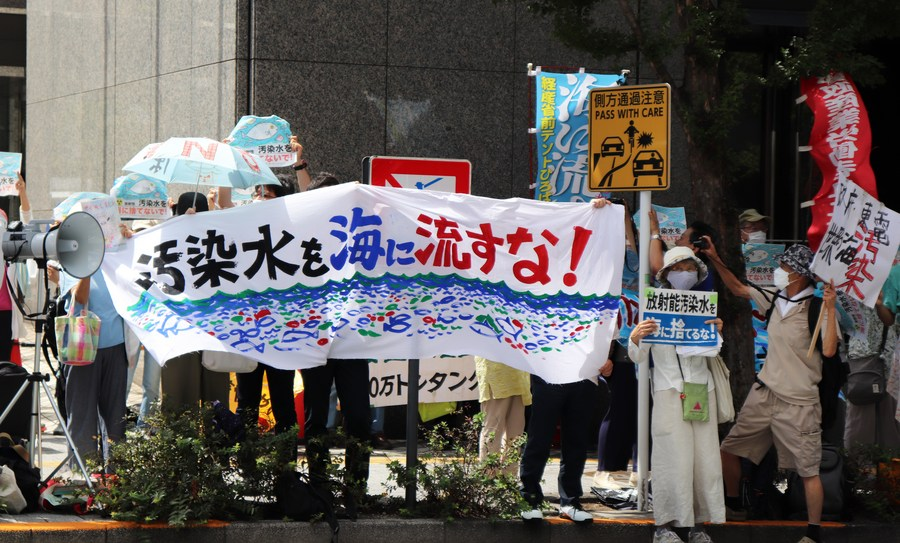China's UN envoy urges Japan to stop nuclear-contaminated water release

People gather to protest the Japanese government and Tokyo Electric Power Company's (TEPCO) decision on releasing nuclear-contaminated wastewater in front of the headquarters of the TEPCO in Tokyo, Japan, Aug 24, 2023. [Photo/Xinhua]
A Chinese envoy to the United Nations urged on Friday Japan to stop releasing nuclear-contaminated water into ocean and called the action "selfish and irresponsible".
Japan's actions are "in disregard of the global public interest" and "transfer the risk of nuclear pollution to the entire world, including Pacific Island countries", Geng Shuang, China's deputy permanent representative to the UN, told a UN General Assembly on the cooperation between the UN and the Pacific Islands Forum.
"This is an extremely selfish and irresponsible act," he said. "The disposal of the Fukushima nuclear-contaminated water is a major transnational issue and is by no means a private matter for Japan," Geng said.
Japan started releasing nuclear-contaminated wastewater from the Fukushima Daiichi Nuclear Power Plant into the Pacific Ocean on Thursday. The nuclear plant was crippled by the massive earthquake and tsunami disaster that struck northeastern Japan in 2011.
The Fukushima nuclear accident, which took place 12 years ago, was a major catastrophe that already caused the leakage of large amounts of radioactive substances into the ocean, Geng said, adding that Japan’s actions could bring a man-made secondary disaster to the local people and the whole world.
Geng said there has been neither any precedent nor universally recognized standards for discharging nuclear-contaminated water into the ocean.
For a long time, there have been serious concerns about the impact of discharging Fukushima's nuclear-contaminated water on the marine environment, food safety, and human health, Geng said.
The legitimacy, legality and safety of Japan's ocean discharge plan have been questioned over and over again by the international community, said Geng. Japan has yet to address major international concerns such as the long-term reliability of the purification facility, the authenticity and accuracy of the nuclear-contaminated water data, and the effectiveness of the monitoring arrangement, he said.
"China and other stakeholders have pointed out on multiple occasions that if the Fukushima nuclear-contaminated water is truly safe, Japan wouldn't have to dump it into the sea and certainly shouldn't if it's not," said Geng.
Geng said that Japan has been citing the assessment report from the International Atomic Energy Agency and he said that the agency has been emphasized that their report is "not an endorsement" of Japan’s decision.
"I would like to emphasize that the release of the treated water stored at Fukushima Daiichi Power Station is a national decision by the Government of Japan and that this report is neither a recommendation nor an endorsement of that policy," the IAEA Director General Rafael Grossi noted in the foreword of the report.
"The IAEA report cannot serve as a ‘pass’ for Japan to discharge the nuclear-contaminated water into the sea," said Geng. "The report cannot give Japan the legitimacy and legality to discharge the sea, nor can it exempt Japan from its moral responsibilities and international legal obligations."
"China calls on the international community to jointly urge Japan to stop its wrongdoing, cancel the ocean discharge plan, communicate with neighboring countries with sincerity and good will, dispose of the nuclear-contaminated water in a responsible manner to prevent damage to the global marine environment and avoid unpredictable harm to the health and well-being of people around the world," said Geng.
- 2023-08-26Expo to reinforce China-ASEAN business ties
- 2023-08-26BRICS builds momentum for better world
- 2023-08-26Stability is aim as US official heads to Beijing
- 2023-08-26Experts' takes on historic BRICS expansion

 西北角
西北角 中国甘肃网微信
中国甘肃网微信 微博甘肃
微博甘肃 学习强国
学习强国 今日头条号
今日头条号











